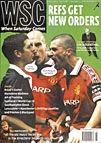 A peculiarly British arrogance is at play over the release of players for the African Nations Cup
A peculiarly British arrogance is at play over the release of players for the African Nations Cup
The African Nations Cup has been in existence for over 40 years, making it slightly older than the European Championship. Until very recently, this biennial competition has received almost no media coverage here. Now, however, virtually every column on the sports pages has something to say about the effect it is having on the English season.
Briefly, this is how the African Nations Cup works. Clubs from Italy, France and Belgium send planeloads of scouts to snap up talented teenagers for next to no money. Most of them stay in the reserves for a couple of years before being offloaded to the Turkish second division, but a few make it. Just recenty the successful minority have begun to be sold to English clubs for large sums. They go back to play for their country. English clubs complain that their absence is damaging their chances in the title race or FA Cup and start to make threatening noises about refusing to release them in future.
This dismissive attitude was neatly summed up by Gary McAllister on Football Focus when he insisted that Mustapha Hadji and Youssef Chippo would much rather be taking part in that afternoon’s FA Cup tie between Coventry and Charlton than “playing for Morocco against Congo”.
In fact the pair were preparing to play for Morocco against their neighbours Tunisia in a match that would all but decide whether they made it past the group stage of the tournament – a tournament for which, as Hadji pointed out, “we have been working hard for the last five or six years”. (That’s the Morocco who beat Scotland 3-0 in the World Cup by the way Gary.)
There’s something peculiarly British about the reaction of some clubs to the news that their high-profile foreign signings are also in demand for international football, as if whatever happens here must by definition be more important than anything else in the world. It will be a good day when England are playing Germany in Euro 2052 and their grizzled old manager Joe Cole has to fend off patronising questions from Ivory Coast TV about his players missing the crucial ASEC Mimosas v Africa Sports league match because of piffling international commitments.
In fairness to Coventry, Gordon Strachan is one of the few managers who has not complained loudly about the absence of “his” players. “As I was aware that this was liable to happen when I signed the pair, I can hardly moan about it now,” he pointed out. Which is surely the point. English clubs continue to buy foreign players in large numbers principally because there is plenty of talent available abroad at relatively cheap prices (though Premiership clubs still seem strangely prone to paying inflated fees).
Until foreign football associations synchronise their international fixtures to fit in with the English domestic programme – Sepp Blatter’s recent call for a one-month worldwide football break in December would not affect the African Nations Cup, which always takes place over January and February – there will always be times when some players are forced to choose between jetting off to play for their country and staying behind for league matches.
Of the players selected for the African Nations Cup, only Bolton’s Mark Fish has threatened to decline a future call-up. Kanu’s reaction was more typical: “I would love to go and play for Arsenal against Man Utd but Nigeria is my fatherland and I want to play for them also.” Naturally, clubs put their own interests first. But in the general scheme of things it is a bit rich for Premiership clubs to protest that they are being ripped off by sub-Saharan Africa.
Yet Chelsea, for one, are determined to feel exploited. “Every two-bob friendly is designated a competitive match,” Ken Bates complains, “forcing clubs to release their players without payment. The clubs even have to insure their players against injury – not the countries who grab the gate receipts.” Let’s see, that’s admission prices in London SW6 v prices in Lagos and a Sky contract v highlights on Eurosport. Who is in a better position to pay Celestine Babayaro’s wages? They may not be the ideal football administrators, but we’re with the Nigerian FA on this one.
From WSC 157 March 2000. What was happening this month